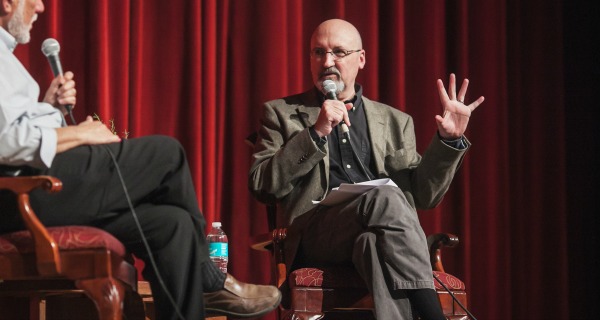
If you’ve ever had the good fortune to read a William Haywood Henderson novel, you’ve been treated to the fresh green trees, the haunts of wild horses, the herds of sheep on the sere grass of Wyoming’s ranges and plains. You can’t mistake Henderson’s Wind River for any other, so it makes sense that another denizen of that literary landscape, Annie Proulx, was moved to call Henderson’s work “some of the most evocative and transcendently beautiful prose in contemporary American literature.” He’s the perfect person to ask, then, about how a writer can cultivate their own particular rhythms and tells, their own home in the long and storied history of fictional and nonfictional worlds.
Q. Who are some of the writers you think have the most developed voices?
A. I think of people whose work is indelible, whose work always stands out as absolutely, individually theirs. These are the writers you return to again and again because you enjoy how they inhabit the world and how that vision inhabits the page. For me, when I was learning to write, I kept returning to Faulkner, Virginia Woolf, Flannery O’Connor, and now that I’m old, I return constantly to Cormac McCarthy, Ishiguro, Jane Austen. The authors change, but the reason for reading them doesn’t—they’re unique, they’re beautiful on the page, and they teach us something about how the world functions.
Q. These are all iconic writers who have such recognizable signatures. Do you think there’s hope for writers who struggle to articulate their vision and access their voice?
A. There’s always hope, for sure. More than hope. It’s what we all work to accomplish across our whole writing career: to find the sharpest, most beautiful, most engaging version of our own particular way of inhabiting the world, and to make that vision come alive on the page. The problem is that our idea of what writing should be gets in the way, and we find ourselves writing someone else’s voice, someone else’s vision, trying to remake what has already been made. Not that that’s bad—that’s how we learn the possibilities available to us as writers, by imitating the masters. Eventually, though, we synthesize what we learned from the masters, we cut away the crazy plagiarism, and what is left is the material that only we can write. I’ve seen it happen time and time again—writers find their way through the static of other voices, other ideas, and find their own, but first they have to be willing to learn from (or steal from) those who came before and, finally, dig deep enough into how they are unique, what they know, how they can express what they know, and what they possess that the world needs to hear.
Q. I love that idea that writers possess something the world needs to hear. Do you ever talk people down from the fear that the world has already heard it all, and heard it better? How might you do that? Asking for a friend.
A. Instead of talking them down from the fear, I’d like to think I talk them up to their potential. Over time, you start to see the real writer emerge from the page. You read their new chapter and say, “This is unique. This is you. Let’s get more of this.” And, of course, this “unique you” is different for every writer. So, as an instructor, you have to keep pushing the students, challenging them to find what matters (for both themselves and for their characters), to let go and face the exposure of the self that comes with great writing. I won’t pretend to be a great writer, but I do remember that the first time I read some of my pages in class that felt to me to be raw and completely exposing of my hidden fears, the response I got was, “Yeah, good. Do more of that.” So I look to push my students to find that moment for themselves. That moment can be completely liberating. You can now write what you were afraid to write, and, if you’re not at least partially afraid to expose something about yourself as you write, you aren’t going far enough. I won’t pretend that it’s an easy process, but it’s absolutely vital if you want to separate yourself from every other writer out there, and, last I heard, there are a lot of writers out there, like maybe a few dozen.
Q. For those who don’t get to take your Voice & Vision workshop at Lit Fest (or even for those who do), is there one pro tip you’d be willing to share?
A. Yes. For all my talk about finding your unique self, you’re also writing from a tradition of great writers. It’s the particular group of writers you’ve read, the experiences you’ve had in your life, your special circumstances, that set you apart. No one has the same list of attributes that you possess. Take some time to make notes about who you are, where you’ve been, what you know, who you’ve read. Then pick up a book by a favorite author, open to a random page, and try writing your own version of that page, channeling the author’s voice and vision while also creating your own story and world. Somewhere beyond the new version you’ve created lies your unique voice. Eventually, the other author falls away, and what’s left is you (influenced by that other writer). It’s easy. Right? No, it’s not easy, but it’s what finding your voice and vision is all about.

